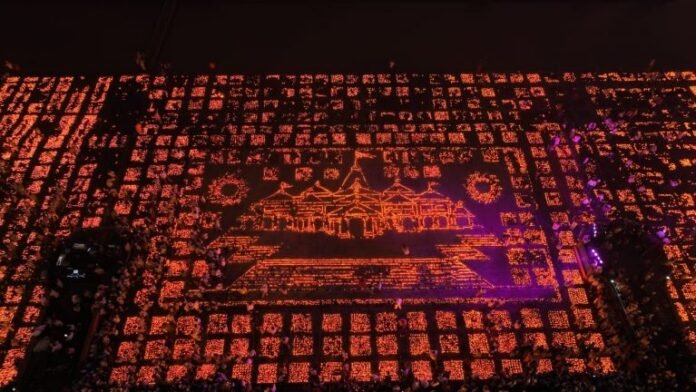Introduction:
Diwali, also known as Deepawali, is a prominent Hindu festival celebrated with great fervor and joy. The festival’s name is derived from the Sanskrit words “deepa” (lamp) and “avali” (row), symbolizing the row of lamps that people light to dispel darkness and welcome light into their lives.
Hindu Calendar Date:
Diwali is observed on the amavasya (new moon) night of the Kartik month in the Hindu calendar, typically falling in October or November. The specific date varies each year based on the lunar calendar. This year festival will be celebrated on November 12, 2023
Lord Rama: Prince of Ayodhya
Lord Rama, an embodiment of virtue and righteousness, is a central figure in Hindu religion, particularly revered in the epic Ramayana. Born to King Dasharatha and Queen Kaushalya in Ayodhya, Rama’s life took unexpected turns, including exile into the forest due to family dynamics. His unwavering commitment to dharma (righteousness) and his exemplary conduct during the exile earned him respect and admiration.
Life Journey:
Rama’s life journey involved facing challenges, notably the abduction of his wife, Sita, by the Rakshasking Ravana. The epic narrates Rama’s quest to rescue Sita, leading to the epic Battle of Lanka, where he vanquished Ravana. The triumphant return to Ayodhya is celebrated as Diwali, symbolizing the victory of light over darkness.
Teachings:
Rama’s training emphasize duty, honor, and adherence to moral principles. His adherence to dharma, indeed in the face of particular immolation, serves as a dateless illustration. The” Ram Rajya” conception, an ideal rule grounded on justice and righteousness, remains a guiding principle in Hindu gospel.
Significance:
Diwali symbolizes the palm of light over darkness, good over wrong. The festivity marks colorful literal events, with one of the most popular being the return of Lord Rama to Ayodhya after defeating the Rakshashking Ravana. It’s a time for soul-searching, joy, and the reaffirmation of one’s commitment to righteous living.
Cultural and Religious Observances:
Diwali is celebrated not only by Hindus but also by Jains, Sikhs, and Buddhists, each community attributing unique significance to the festival. The lighting of diyas (lamps) and candles represents the triumph of light, and homes are decorated with colorful rangoli patterns and vibrant lights.
Rituals and Traditions:
The festival typically spans five days, each with its own set of rituals and traditions. Cleaning and decorating homes, performing religious ceremonies, exchanging gifts, and enjoying festive meals are integral parts of Diwali celebrations. Fireworks light up in sky, adding to the festive atmosphere.
Ekadashi
Significance: Devotees observe a fast and worship Lord Vishnu.
Wagh Baras
Significance: Also known as Vasu Baras, it is dedicated to the cow and her calf, symbolizing the bond between a mother and child.
Dhanteras
Significance: Marks the beginning of Diwali celebrations, symbolizing wealth and prosperity.
Kali Chaudas
Significance: Also known as Narak Chaturdashi, it commemorates the victory of Lord Krishna over the demon Narakasura.
Diwali
Significance: Main festival day dedicated to Goddess Lakshmi, symbolizing the triumph of light over darkness.
Social and Community Celebrations:
Diwali is a time when families come together, friends visit each other, and communities organize various events. It is an occasion for bonding, forgiveness, and spreading joy. The exchange of sweets and gifts symbolizes goodwill and prosperity.
Modern Observations:
In contemporary times, Diwali has evolved into a global celebration, transcending cultural and religious boundaries. Many non-Hindu communities participate in the festivities, appreciating the universal message of light triumphing over darkness.
Conclusion:
Diwali, beyond its religious roots, stands as a testament to the enduring values of hope, compassion, and the eternal struggle between good and evil. It continues to be a vibrant and inclusive festival that unites people in the celebration of light and the triumph of righteousness.



